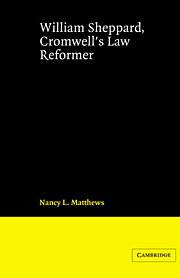Book contents
- Frontmatter
- Contents
- Preface
- Notes on Style and on Bibliography
- Abbreviations
- Introduction
- 1 Biography
- 2 Early Legal Works, 1641–1654
- 3 The Protectorate Period, 1654–1659
- 4 England's balme
- 5 Later Contributions to Legal Literature, 1660–1674
- 6 Conclusion
- Bibliographical Comment
- Chronological Bibliography of Sheppard's Books
- Sheppard's Sources
- Index
- CAMBRIDGE STUDIES IN ENGLISH LEGAL HISTORY
2 - Early Legal Works, 1641–1654
Published online by Cambridge University Press: 28 October 2009
- Frontmatter
- Contents
- Preface
- Notes on Style and on Bibliography
- Abbreviations
- Introduction
- 1 Biography
- 2 Early Legal Works, 1641–1654
- 3 The Protectorate Period, 1654–1659
- 4 England's balme
- 5 Later Contributions to Legal Literature, 1660–1674
- 6 Conclusion
- Bibliographical Comment
- Chronological Bibliography of Sheppard's Books
- Sheppard's Sources
- Index
- CAMBRIDGE STUDIES IN ENGLISH LEGAL HISTORY
Summary
Everyone, no matter of what rank, should do their duty and so rest assured that the fulfillment of each traditional task was part of the work of justice which rendered it a work of God. ‘Cursed is he that doth the work of God negligently.’ And what you find here, you have warrant to do; do it, and fear not, for it is written, ‘He shall give his angels charge concerning thee, to keep thee in thy ways.’
Introduction, Constables (1641), sig. A8rLet able and fit men be chosen to and kept in these offices. And truly (if I be not mistaken) herein lieth almost the whole work of reformation in church and commonwealth, to make and keep the officers thereof good … Had our bishops and officers about them been chosen out of the best men of the time, doubtless Episcopacy had not been so grievous and odious; and exchange it for Presbytery, and let the Presbyters be ambitious, covetous and contentious, and may not this model be more grievous and odious? The like may be said of the Independent model … [but] ‘when the righteous are in authority the people rejoice’ (Proverbs 29.2) … Let our justices of the peace then be curiously chosen out of the fittest of men.
Introduction, The whole office of the country justice of the peace (1650), sigs. A5r– vThe first ten of Sheppard's twenty-seven books were published in the troubled times between 1641 and 1654 when the nation was learning to cope with the dislocations of the civil war and the uncertainties of the commonwealth.
- Type
- Chapter
- Information
- William Sheppard, Cromwell's Law Reformer , pp. 72 - 102Publisher: Cambridge University PressPrint publication year: 1985

